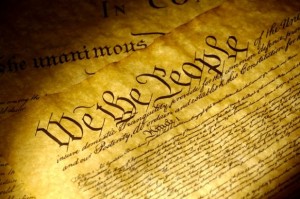The Tenth Amendment: “The powers not delegated to the United States by the Constitution, nor prohibited by it to the States, are reserved to the States respectively, or to the people.”
The Tenth Amendment protects Americans from big, intrusive federal government action. The heart of the Tenth Amendment is that the federal government has only those powers explicitly listed in the Constitution and all other powers are reserved to the States and to the people, and therefore explicitly denied to the federal government.
In contrast, state governments have all powers not explicitly prohibited or withheld by the state constitution or by the U.S. Constitution. Thus, states have broader powers and can, do things that Congress cannot do. For example, states can require young students to attend school and drivers to purchase automobile insurance.
Too often those in Congress and the White House assume that the federal government can do whatever the majority wishes. However, the Founders clearly and explicitly intended to prevent the majority from doing whatever it wished. Thus, they gave the federal government a very limited and carefully chosen list of powers and they reserved all other powers for the states and the people. They also provided an elaborate system of checks and balances – all to limit the power of the majority to impose its will.
The Founders felt so strongly about limited federal power as a bulwark of liberty that they added the Ten Amendment as the final exclamation point in the Bill of Rights – the federal government could not trample the rights of the people by assuming powers that it did not have, and that had been reserved to the states and the people.
At the heart of the debate over Obamacare before the Supreme Court is the question – does the federal government have the authority under the U.S. Constitution to require citizens to purchase a product? If the justices can read and understand the simple language of the Constitution, they will strike down the law because the federal government does not have the authority to do what it attempted to do in this statute.
This author is not a supporter of the Massachusetts healthcare law, but it is constitutional. There are significant differences between the Massachusetts law and ObamaCare, but perhaps the biggest difference is that Massachusetts had the authority to pass its healthcare law. That doesn’t mean it was a good idea, it just means it was constitutional. But the federal government did not have the authority to pass Obamacare. Obamacare exceeds the enumerated and limited powers given to the federal government and the limitations of the Tenth Amendment.
The Tenth Amendment is also an explicit statement of the governing principle of federalism. Federalism is the idea that there is a national government with limited powers and there are state governments with broader powers, both receiving their authority from the people. Simply stated, federalism recognizes the fact that the states are not merely political subdivisions of the federal government, but that they are separate governmental units that derive their power directly from the people and not from the federal government.
These are not old fashioned or outdated ideas. They constitute real and practical protections against the bullying powers of big government on the federal level. The Founders put in place checks and balances, limitations on power, and divisions of power – all designed to keep federal government from becoming too big, too powerful, and too intrusive. The Tenth Amendment is key to their wise designs to limit the power and scope of the federal government.
– – – – – – – – – – – –
George Landrith is the president of Frontiers of Freedom, a public policy think tank devoted to promoting a strong national defense, free markets, individual liberty, and constitutionally limited government. Mr. Landrith is a graduate of the University of Virginia School of Law, where he was Business Editor of the Virginia Journal of Law and Politics. In 1994 and 1996, Mr. Landrith was a candidate for the U.S. House of Representatives from Virginia’s Fifth Congressional District. You can follow George on Twitter @GLandrith.
